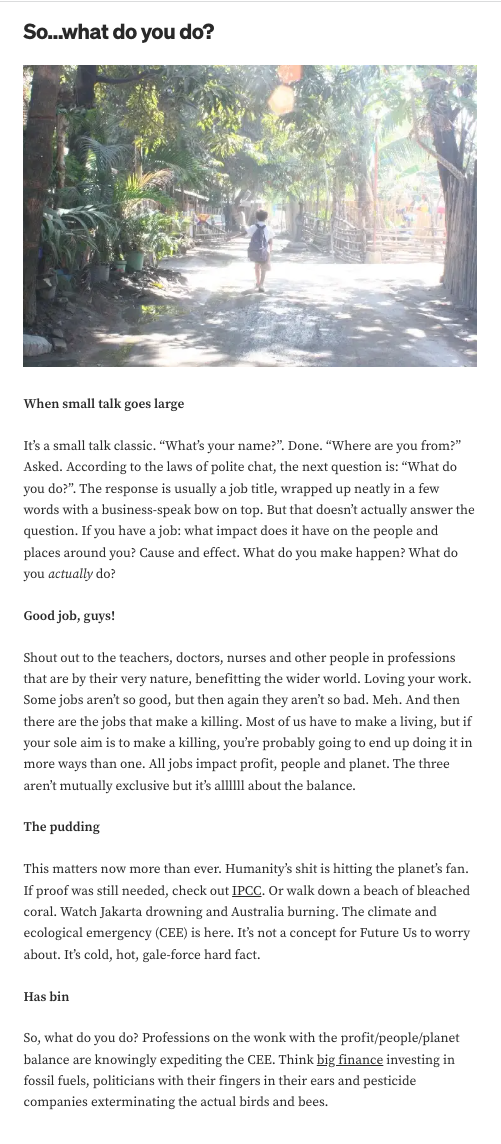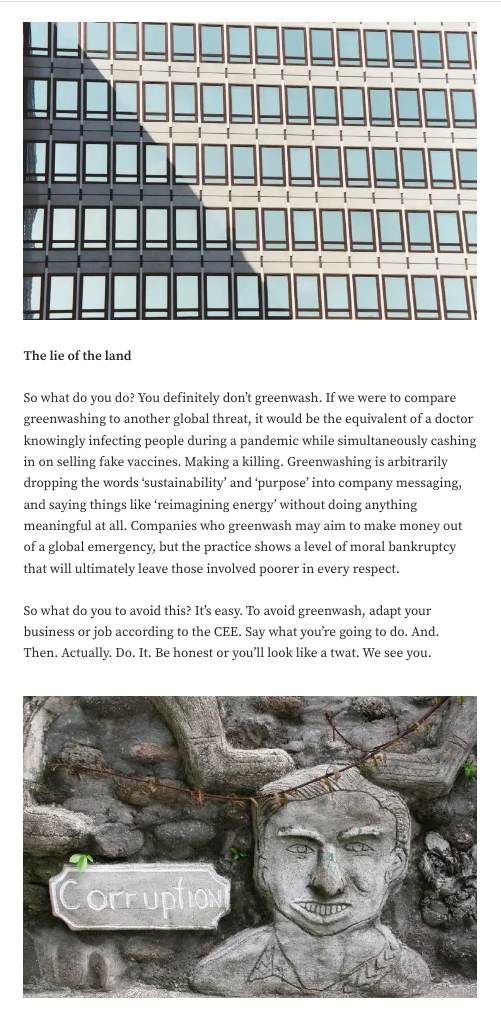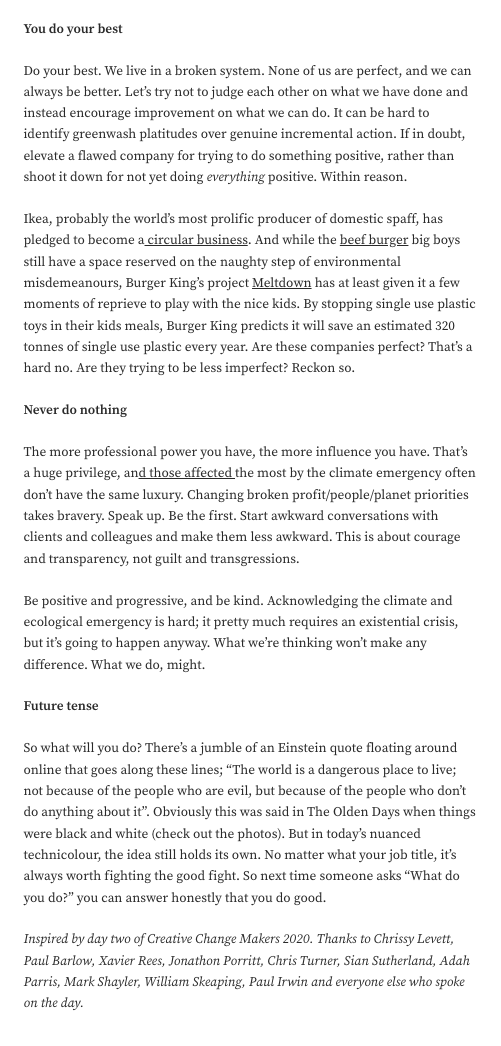So…what do you do?
I had a pop at dismantling capitalism and saving the planet in approx 1,000 words and a few hyperlinks. Why not, eh?



When small talk goes large
It’s a small talk classic. “What’s your name?”. Done. “Where are you from?” Asked. According to the laws of polite chat, the next question is: “What do you do?”. The response is usually a job title, wrapped up neatly in a few words with a business-speak bow on top. But that doesn’t actually answer the question. If you have a job: what impact does it have on the people and places around you? Cause and effect. What do you make happen? What do you actually do?
Good job, guys!
Shout out to the teachers, doctors, nurses and other people in professions that are by their very nature, benefitting the wider world. Loving your work. Some jobs aren’t so good, but then again they aren’t so bad. Meh. And then there are the jobs that make a killing. Most of us have to make a living, but if your sole aim is to make a killing, you’re probably going to end up doing it in more ways than one. All jobs impact profit, people and planet. The three aren’t mutually exclusive but it’s allllll about the balance.
The pudding
This matters now more than ever. Humanity’s shit is hitting the planet’s fan. If proof was still needed, check out IPCC. Or walk down a beach of bleached coral. Watch Jakarta drowning and Australia burning. The climate and ecological emergency (CEE) is here. It’s not a concept for Future Us to worry about. It’s cold, hot, gale-force hard fact.
Has bin
So, what do you do? Professions on the wonk with the profit/people/planet balance are knowingly expediting the CEE. Think big finance investing in fossil fuels, politicians with their fingers in their ears and pesticide companies exterminating the actual birds and bees.
And then there’s the branders and advertisers elevating products of destruction to products of desire. Alan Jope, Chief Executive of Unilever was reported to have said recently: “I sometimes wonder if we’re in the branded litter business, branded trash”. Spot on, Alan. The world’s in flames, but at least the insides of our bins are looking fit. Nice one guys. And even the bins have to go somewhere. Recycling is good, but it’s not the panacea we want it to be. We need to create less packaging in the first place. Whatever name you want to give it, single use plastic = always pointless. Still, that sexy bin though. Sigh. RIP, world. Rest In Plastic.
In good company
This is what some people do. The green economy is a huge commercial opportunity. Increasingly, being green is the only way for businesses to survive. Mark Carney, the hemp-smelling bivouac-dwelling crusty who…oh wait, no. Mark Carney is the Governor of the Bank of England. Mind. Blown. Anyway, he recently talked of the business opportunity in climate activism. He was saying years ago that climate change could have a catastrophic impact on financial firms that don’t take action. So that’s what Mark Carney does, and that’s his two bobs worth well spent. Cheers Mark.
The cool kids are doing this. There are now 3,243 (and counting) B Corps around the world including Danone, The Guardian and Ben & Jerry’s. A what corp? A B Corp. They’re certified businesses that meet strict standards of social and environmental performance, public transparency and legal accountability to balance profit and purpose. It’s a whole thing and it’s getting bigger. History will not look kindly on companies that were the last to balance profit with sustainability and environmental purpose. This cannot be stressed enough: in every industry, ‘business as usual’ is over whether we like it or not.
The lie of the land
So what do you do? You definitely don’t greenwash. If we were to compare greenwashing to another global threat, it would be the equivalent of a doctor knowingly infecting people during a pandemic while simultaneously cashing in on selling fake vaccines. Making a killing. Greenwashing is arbitrarily dropping the words ‘sustainability’ and ‘purpose’ into company messaging, and saying things like ‘reimagining energy’ without doing anything meaningful at all. Companies who greenwash may aim to make money out of a global emergency, but the practice shows a level of moral bankruptcy that will ultimately leave those involved poorer in every respect.
So what do you to avoid this? It’s easy. To avoid greenwash, adapt your business or job according to the CEE. Say what you’re going to do. And. Then. Actually. Do. It. Be honest or you’ll look like a twat. We see you.
You do your best
Do your best. We live in a broken system. None of us are perfect, and we can always be better. Let’s try not to judge each other on what we have done and instead encourage improvement on what we can do. It can be hard to identify greenwash platitudes over genuine incremental action. If in doubt, elevate a flawed company for trying to do something positive, rather than shoot it down for not yet doing everything positive. Within reason.
Ikea, probably the world’s most prolific producer of domestic spaff, has pledged to become a circular business. And while the beef burger big boys still have a space reserved on the naughty step of environmental misdemeanours, Burger King’s project Meltdown has at least given it a few moments of reprieve to play with the nice kids. By stopping single use plastic toys in their kids meals, Burger King predicts it will save an estimated 320 tonnes of single use plastic every year. Are these companies perfect? That’s a hard no. Are they trying to be less imperfect? Reckon so.
Never do nothing
The more professional power you have, the more influence you have. That’s a huge privilege, and those affected the most by the climate emergency often don’t have the same luxury. Changing broken profit/people/planet priorities takes bravery. Speak up. Be the first. Start awkward conversations with clients and colleagues and make them less awkward. This is about courage and transparency, not guilt and transgressions.
Be positive and progressive, and be kind. Acknowledging the climate and ecological emergency is hard; it pretty much requires an existential crisis, but it’s going to happen anyway. What we’re thinking won’t make any difference. What we do, might.
Future tense
So what will you do? There’s a jumble of an Einstein quote floating around online that goes along these lines; “The world is a dangerous place to live; not because of the people who are evil, but because of the people who don’t do anything about it”. Obviously this was said in The Olden Days when things were black and white (check out the photos). But in today’s nuanced technicolour, the idea still holds its own. No matter what your job title, it’s always worth fighting the good fight. So next time someone asks “What do you do?” you can answer honestly that you do good.